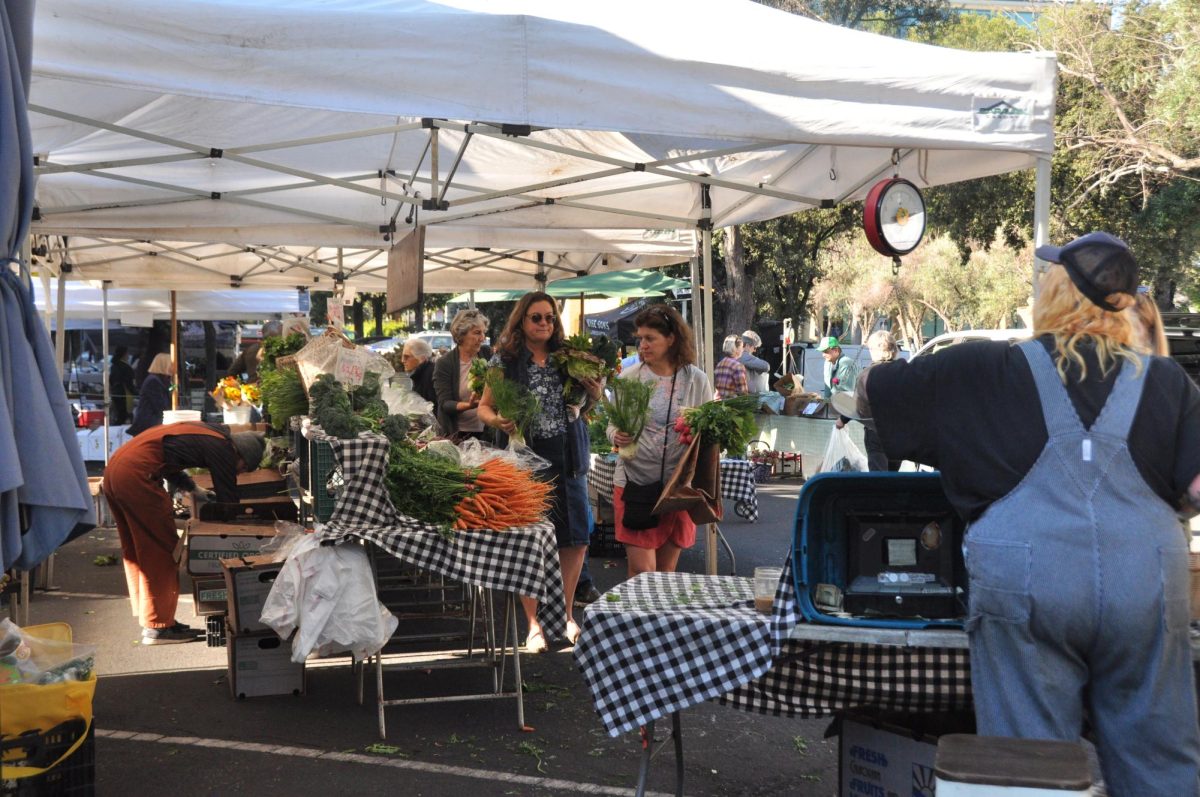Crates piled high with colorful seasonal produce, the aroma of fresh fruits interwoven with the spices of baked goods, friendly chattering as vendors hand out samples — these are the sights, scents and sounds of the three Palo Alto farmers markets. The 8 a.m. to 12 p.m. Saturday Gilman Street market, the 9 a.m. to 1 p.m. Sunday California Avenue market and the 9:30 a.m. to 1:30 p.m. Wednesday Veterans Affairs Hospital market have similar aims. They all provide accessible organic foods, support local businesses and foster community, but each offers a distinctive experience.
Every Saturday, a parking lot on Gilman Street transforms into a bustling market, with over 30 California vendors selling items from produce to seafood to pastries. While all three farmers markets in the city are nonprofits, Gilman Street is the only market run by an all-volunteer board of directors, with profits donated to Avenidas, a local nonprofit that supports seniors.
According to Board Vice President Sheryl Klein, community members founded the Gilman Street farmers market in 1981 to make fresh, organic produce more accessible to seniors, as clothing stores and restaurants replaced grocery stores in downtown Palo Alto.
The Gibson family has sold dried apricots and walnuts from its family farm, Gibson Farms, at the Gilman Street market since its inception. Vendors and siblings Ginger and Gilbert Gibson make the one-hour drive from Hollister to Palo Alto each weekend. “At some of the other markets we’ve been to, people will try to get a lower price for the product, but that doesn’t happen here,” Ginger Gibson said. “We’ve made a lot of friends over the years, and the tempo of this market is really welcoming. Although it’s a parking lot, it almost looks like a county fair.”
Along with rotating vendors to ensure a diverse array of products, the Gilman Street market has adapted to the community’s needs by transitioning from a seasonal to year-round market. “We heard from folks in the community that it would be really nice to have access to the market year-round, so a couple years ago, we opened for a full year-round market,” Board President Annie Warner said. “We still obviously don’t have some vendors in the winter — none of our stone-fruit vendors have anything to sell in January — but we do take on more prepared-food vendors, and some of our produce vendors bring root vegetables throughout the winter.”
The Urban Village Farmers Market Association established Palo Alto’s second farmers market on California Ave in 2007. The California Avenue market features the most vendors of the three in Palo Alto and boasts textile and craft stalls. Both the California Avenue and Gilman Street farmers markets also feature a rotating cast of live music performers.
For those unable to attend the weekend farmers markets, the seasonal VA Hospital market — founded by the Pacific Coast Farmers Market Association in 2010 — hosts a variety of stalls in front of the hospital’s main entrance.
While the market is open to the public, market manager Rebecca Barner notes that the majority of clients are veterans and hospital workers. “We have a couple of produce and bakery vendors (here), but we find that for this market, it’s more popular when it comes to hot food because a lot of the people that work here or live here come to get lunch,” she said.
While the city determines the markets’ overall layout, each market chooses its own vendors and stall setups, according to California Avenue market manager Scott Martin. Stall placement is based on California agricultural laws, and there are specific locations for each type of produce.
California Avenue market manager Scott Martin explained that the health and sustainability benefits of shopping at farmers markets often make the higher price worth it. “Here, you can actually meet the people that grow (produce) or pick it, or the ones that milk the cows,” he said. “If you buy meat here, you’re gonna know the day they ended the animal’s life and it’s only coming from a few miles away. It’s nice to know what goes into your body and know the people that raised everything (and) cared for it.”
Ginger Gibson recommends coming to the market as a fun weekend activity for everyone, regardless of whether they plan to buy food. “I’d recommend this market to anybody, even just to walk around during different seasons because the products will change, the smells will change,” she said.
























